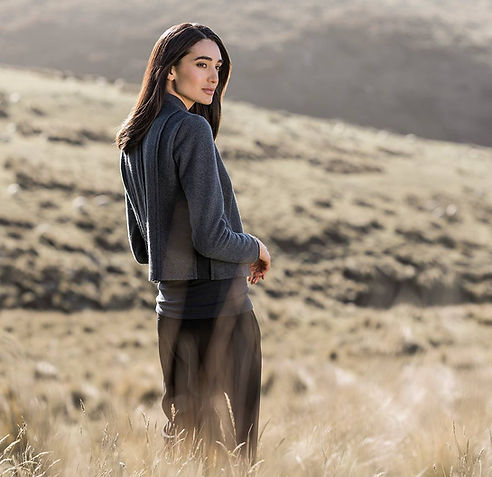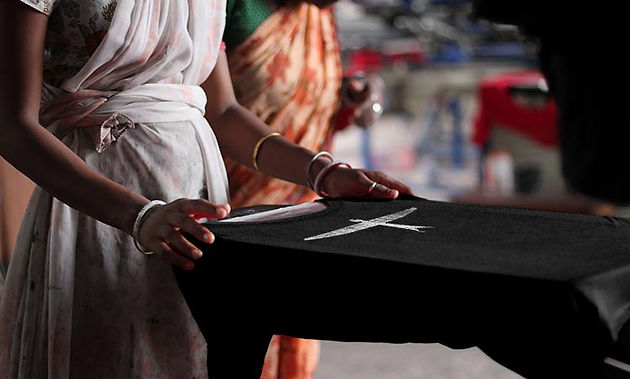
PERI DRYSDALE
UNTOUCHED WORLD
IMAGE: UNTOUCHED WORLD
TRAILBLAZER
Peri Drysdale - Founder and CEO
of Untouched World

“The major issue we see for business is the tension that exists from producing goods for profit, growth and expansion at the expense of our environment and our people.
At Untouched World we are working hard to design the business to place emphasis on an approach that seeks to holistically leave things in a better way. “
Untouched World is the first fashion company in the world to be recognised by the United Nations for sustainability. The brand says it achieved this by getting basic things right from the get-go. It looks at every aspect of its business with sustainability in mind. That means considering the total life impact of what it produces, from sustainably grown fibres, to GOTS certified organic dyes and water based prints, right through to how its team dispose of their banana skins after lunch.
“Our belief is that although we are small in global terms, we can still have a large impact.”
Untouched World launched with an undyed certified wool collection in 1996 and has gone on to develop innovative luxury materials such as Ecopossum, made of merino wool and possum fur, and Kapua, a blend of cashmere, silk, and ultra fine possum. (The Brushtail Possum is classified as a pest in New Zealand, as it is a threat to native forests and wildlife. They’ve been filmed eating the eggs and chicks of the endangered kōkako as well as kiwi, kereru, fantails and tuis and there are approximately 60 million of them covering 95% of the country.)
Welcome Peri, thanks for talking to us. Firstly, can you tell me a little about how you started the company?
It really all started with the idea of adding value to a New Zealand primary industry. My father was a global thinker so we talked a lot about how can we add value to NZ wool and take it global. I was travelling a lot and noticed a huge change globally from year to year. It was an agonizing period for me discovering the degradation to the planet from the clothing and textiles industry, so this was really the motivation to do things differently.
Untouched World has been invited by the United Nations as a global exemplar on Sustainable Development to a number of UN conferences. Can you tell me about what sustainability, and sustainable development means to your business?
Sustainable Development for us is making sure that every step of what we do is thought through. So we are not just doing ecological fabrics, we are not just trying to retain cultural values, or look after workers in another country. We believe very strongly that everything is interconnected. While we look after the environment we also have to look after the people. Because if we don't look after the people, they won't look after the environment. If the environment is not right the people won't be able to flourish and survive.
You can’t focus on one aspect of the sustainability issue. It’s a tall order; it’s been one of the most challenging things, to be working at a comprehensive level but its the only way to get real change.

"For us, this is a journey - we will never say ‘we’ve done it’."
IMAGE: UNTOUCHED WORLD
Science is developing all the time and we get more knowledge every day. And some of the things we did in 2000 were not necessarily the right things. We paid a lot more for recycled paper in the very early days and then we realised that it was taking more energy than using sustainably harvested forests. Sometimes there is no perfect solution. If you do this, it impacts that; so it’s often a compromise. You have to keep making the best judgement you can.
Can you tell us what aspects are taken into consideration in the design process to ensure you produce your garments in as sustainable a way as possible?
We start with the product, and the materials we use the most, because these have the biggest impact on the environment. Wool, cotton, linen. We map the full lifecycle of these products, from the fibre all the way through their life, through their life’s use and back to being reused, upcycled or recycled. We make judgement calls on those impacts.
For example, there might be a conversation about a garment that has a certified organic outer and it has an amazing eco lining but there might be a performance based element that is required, such as waterproofing. So do you put that feature in, to give the product more value to the customer, or do you leave it out making it more ‘pure’, but its not as functional. We question all of our products in this way.
It comes down to being fit for purpose. Sometimes compromises have to be made. The best garment will suit the users need and have more longevity and therefore a better impact on the environment, and the bulk of what they are buying is better for people and the planet.
What about sustainability within the company?
Within the company itself we are looking at water use, energy use and waste to landfill.
We also look at people development within the company. We are a female dominant company, although the number of males is increasing. Our current production manager has worked her way up all the way in the company. We like to grow our staff through the company internally.
Externally, we founded the Untouched World Charitable Trust in 2000, and a percentage of sales goes towards this. Through this we deliver leadership programs for students across New Zealand with a focus on sustainability and environmental stewardship. We have gained real momentum and we are now working on establishing the program in India to accelerate this on a larger scale.
Project U is a not for profit project that we run. Organic cotton tee shirts and other products are made in Kolkata, India, by women who were once marginalised by poverty and prostitution, and every purchase supports this program along with the Untouched World Charitable Trust leadership program.

IMAGE: UNTOUCHED WORLD PROJECT U
Sustainability is at the heart of what you do. How do you work to minimise environmental impacts, and how difficult is it to ensure that your provenance and sustainability standards are met?
Traceability is a real challenge. How can you be sure that the bale of organic cotton that you send to a facility is the same cotton that comes back to you? How can you be sure the certifications are real? Tracing on merino wool can be done now through isotopes, however with merino, it’s impossible to trace back to farm level due to the way wool is baled up and sent for processing. Our merino is Zque, and this all stays together so we are able to be certain its our wool, just not the exact farm it was sourced from.
For our materials, we look for the Global Organic Textile Standard (GOTS) which is easily met these days. We use certified German dyes, as these are some of the best there is. However, in an ironic way, the dye company won’t disclose their ingredients so its hard for us to re-import our garments into Germany without knowing some of the dye specifications that we need to specify for the EU's strict import regulations.
We’ve used extruded bamboo fabric in the past. Bamboo that is chemically made is ok if it’s done in a closed loop system, but its so hard to trace bamboo that you don't know what has been done to it - so we have stopped using it for now. Where possible we source and use environmentally positive alternatives. Instead of plastic for example, we use paua shell buttons.
Clothing waste is a huge issue right now in the fashion industry, how does UW address this, do you take back and/or repair garments to extend their life?
We have always offered unlimited repair on our garments. Our garments are very high quality, some repairs come back after 25 years, and we will repair them! So we don’t have a lot of garments to take back. What we are looking at is creating a zero waste range with our own waste fibre, and sent back garments. We want to recycle our own fibre from process waste and combine it with returned garments, to make into new garments.

IMAGE: UNTOUCHED WORLD

IMAGE: UNTOUCHED WORLD
What role does business have in driving change both with consumers and with industry towards more sustainable/responsible practices, what’s your take on making change happen?
It has to come from business. Clothing is powerful. If you have a picture on a wall, you stop seeing it after a while. When you simply move it, then people take notice, think it's new even. The same with our clothes. So fashion is a good vehicle to generate conversation. We all desire newness, and reinvention, so how do we address it in an innovative way?
What advice would you give to businesses that wanted to start to operate more sustainably. Where should they start?
It can be overwhelming to start with, but there are so many more resources available now, for consumers and for brands. A word of advice would be, to be really careful that any claims that you make are followed. It’s all about knowledge. Use common sense and take things a step at a time. One step, and then another step. The issues coming up of synthetics and microfibers in our water are a compelling reason to make change even if nothing else is!
What about for consumers, how do you think we can SLOW DOWN mindless consumption and SPEED UP the pace of positive change with consumers?
For consumers, awareness and education are key. Once you ‘know’ then you won’t want to continue to cause this harm. That is what we are trying to achieve with our sustainable development program with young people. To make them aware, so they can go out and lead by example with their friends, families, and colleagues as they go forward in their lives.
The core wardrobe that can last a lifetime in quality fabrics is important, and then having injection pieces of fashion or colour that can give the newness and reinvention.
Thank you so much for sharing your insight and your knowledge Peri, it was such a pleasure to talk to you!
Find out more about Untouched World here.
